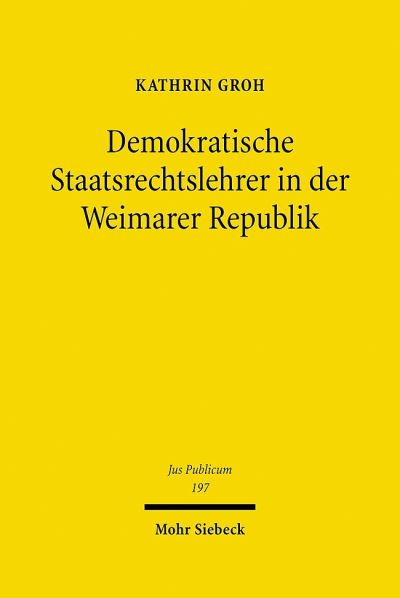
English summary: It is only recently that researchers have started to focus their attention on the theories of democracy developed by teachers of public law in the Weimar Republic. In this work, Kathrin Groh analyzes the writings of the five major figures in this era: Hugo Preuss, Gerhard Anschutz, Richard Thoma, Hans Kelsen and Hermann Heller. She studies the concepts of the state and the constitution used by the teachers of public law, who had been socialized in the German Empire, to react to the challenges of the Weimar Republic and the remedies they found to solve the Republic's crises in the spirit of the constitution. In spite of their differences, their answers to the main challenges of the Republic, such as state ideology, leadership, political parties, pluralism, the governmental system and fundamental rights were determined by their thinking in terms of the rule of law.
German description: Das demokratische Denken von Weimarer Staatsrechtslehrern findet erst seit kurzem die ihm gebuhrende Aufmerksamkeit in den Wissenschaften. Kathrin Groh analysiert hier die Werke der grossen Funf: Hugo Preuss, Gerhard Anschutz, Richard Thoma, Hans Kelsen und Hermann Heller. Sie untersucht, mit welchen Staats- und Verfassungskonzepten die im Kaiserreich sozialisierten Staatsrechtslehrer auf den Umbruch zur Weimarer Republik reagierten und welche Ideen sie entwickelten, um deren Krisen im demokratischen Geist der Verfassung zu losen. Trotz aller Unterschiede im Detail werden ihre Antworten auf zentrale Herausforderungen der Republik - wie Staatsbild, Fuhrung, Parteienstaat, Pluralismus, Regierungssystem und Grundrechte - von ihrem Rechtsstaatsdenken bestimmt. Sie fugen sich zu einer Synthese aus Rechtsstaat und freiheitlicher Demokratie zusammen, zum modernen demokratischen Verfassungsstaat.
| ISBN: | 9783161502224 |
| Publication date: | 13th October 2010 |
| Author: | Kathrin Groh |
| Publisher: | Mohr Siebeck |
| Format: | Hardback |
| Pagination: | 648 pages |
| Series: | Jus Publicum |
| Genres: |
Constitution |